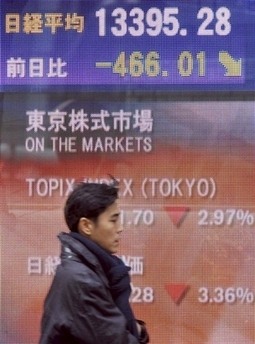Asia markets sink amid pessimism over US
Updated: 2008-01-21 17:01
TOKYO -- Stock markets across most of Asia fell Monday following declines on Wall Street last week amid investor pessimism over the US government's stimulus plan to prevent a recession.
|
|
A contraction in the American economy would likely hurt profits at Asian exporters, although rising trade and investment within the region has made Asia less dependent on the US economy than in the past.
Investors sold off shares, unimpressed by the economic stimulus plan President Bush announced Friday. The plan, which requires approval by Congress, calls for about $145 billion worth of tax relief to encourage consumer spending.
Japan's benchmark Nikkei 225 index slid 3.9 percent to close at 13,325.94 points, while Hong Kong's Hang Seng index was down 3.5 percent in afternoon trading at 24,323.44.
China's Shanghai Composite index plunged 5.1 percent and India's market was down 2.7 percent. Markets in South Korea, Australia, Singapore and the Philippines also sank.
"People are certainly nervous about a potential recession in the US spilling over to the rest of the world," said David Cohen, Director of Asian Economic Forecasting at Action Economics in Singapore.
"Maybe there's still some wariness about politicians are able to come up with a compromise and act sufficiently quickly," Cohen said. "I think the impact would be marginal anyway."
On Friday, the Dow Jones industrial average slid 0.5 percent to 12,099.30, and some analysts warned that the US market could be in for a period of protracted declines.
Investors also have shrugged assurances from Federal Reserve Chairman Ben Bernanke that the US central bank is ready to act aggressively -- which means a likely big interest rate cut later this month -- to help support an economy pummeled by devastation in the housing and credit markets.
Jitters about the US economy have dragged on Asian markets, many of which surged last year. Since the start of the year, Japan's benchmark index has declined 13 percent, while Hong Kong's blue-chip index is down more than 11 percent.
In Tokyo trading, exporters got hit hard, with Toyota Motor Corp. losing 3.3 percent and Honda Motor Co. sinking 3.4 percent. Banks also declined; Mizuho Financial Group lost 5.3 percent.
Still, increased trade within Asia has made the region less reliant on the United States than in the past, prompting some analysts to predict that Asia won't suffer dramatically from a US recession.
Excluding Japan, 43 percent of Asia's exports go to other nations in the region, Lehman Brothers calculates -- up from 37 percent in 1995.
A drop of 1 percentage point in US economic growth would shave 1.3 percentage points from China's growth rate due to lower exports, Citigroup estimates. But China's economy will still likely expand 11 percent this year, the investment bank predicts.
Also, some strategists say Asian markets are now oversold and will rebound as investors snatch up stocks that have fallen to attractive levels.
"We hold our view that the rapid correction in the past two weeks is offering a good opportunity to buy quality stocks," Taifook Research in Hong Kong said in a note.
|
|
|
||
|
||
|
|
|
|
